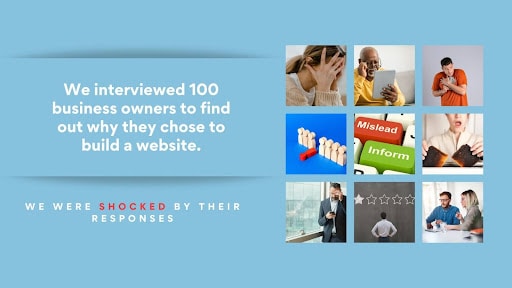Ever feel like you’re being asked the same question over and over again? As a small business owner, I’m sure you’re used to being asked (or told) why you need a website. But what if we flipped the script? I decided to do something different and reached out to 100 businesses that my team and I deemed did not have an effective website to find out: Why did they have a website in the first place?
Here’s what we found.
The Funny (and True) Responses We Received

When we posed this question to 100 small business owners, we got all sorts of responses. Here are five of the most sadly funny answers:
- “Because everyone else has one.” – Peer pressure is real, even in the business world.
- “My nephew built it for me.” – Family projects can be… interesting.
- “I thought it would magically bring customers.” – Spoiler alert: it didn’t.
- “It was part of a package deal.” – Because nothing says ‘effective marketing strategy’ like a bundled offer.
- “I needed a place to put my cat’s pictures.” – Priorities, right?
Reasons You Shouldn’t Get a Website

Now, let’s get serious. There are many reasons businesses have been sold websites—sometimes websites they don’t need or websites that don’t do anything for their businesses. But most of these reasons can be clubbed into six categories:
- Vanity Projects: Getting a website just to show off, without any strategic purpose.
- Misinformation: Being told that a website alone will solve all business challenges.
- Pressure from Competitors: Feeling the need to have a website just because competitors do.
- Bundled Offers: Buying a website as part of a package deal, without considering its actual value.
- Family and Friends: Creating a website because a relative or friend offered to do it for free or cheap.
- Outdated Advice: Implementing a website based on old strategies that no longer work.
Regardless of the reasons, it’s evident that the website served no purpose for these businesses other than taking up server space, thereby contributing to greenhouse gas emissions.
So, if this is the direction you’re headed, spare yourself the time, money and effort AND spare the planet of the resulting unnecessary greenhouse gas emissions.
However, if you’re still considering getting a website for your business, keep reading to find out what you should be looking for in a website and how it can truly benefit your business.
Reasons You Should Get a Website

After I reviewed the first draft of this post, I realised that the post seemed incomplete without an honourable mention of the RIGHT reasons for actually getting a website.
I know you’ve heard a million of these before, so I’ve summarised the most important ones in 6 short points:
- Sales: A website can act as a 24/7 storefront, enabling customers to purchase your products or services anytime.
- Customer Service: Provide essential information, FAQs, and support options that enhance customer experience.
- Branding: Establish a professional online presence that reflects your brand’s identity.
- Marketing: Leverage SEO, content marketing, and digital advertising to reach a broader audience.
- Credibility: A well-designed website can increase trust and establish your business as a legitimate entity.
- Analytics: Gain insights into customer behaviour, preferences, and trends to make informed business decisions.
Building the Right Website for Your Business

Now, if your business is looking to achieve any of the above goals, you’ll want to ensure that you build a website that’s right for your business. Here are the key points to consider:
- Define Your Goals: Clearly outline what you want your website to achieve—be it sales, lead generation, or customer support.
- Know Your Audience: Understand who your target audience is and design your website to meet their needs.
- Focus on User Experience: Ensure your website is easy to navigate, mobile-friendly, and provides valuable content.
- Invest in SEO: Optimise your website for search engines to improve visibility and attract organic traffic.
- Regular Updates: Keep your website content fresh and up-to-date to maintain relevance and engagement.
What About Existing Websites That Are Just Sitting There?

A common objection I hear is: “I already have a website that didn’t do anything for our business, it’s just sitting there. Our business doesn’t need one. Moreover, I don’t want to throw good money after bad.” Fair point. Businesses have been burnt so many times, having sold websites and marketing services that don’t work, I don’t blame them.
But I wanted to address the dangers of a “dead” website that most businesses don’t realise. In fact, a non-functional website can impact your business negatively to the extent that it’ll turn away customers and deter repeat business – all while you have no idea that it’s doing that in the background.
Let me explain. Imagine having a shop with a broken sign, dusty windows, and outdated displays. Potential customers walk past, assume you’re closed, or worse, that you don’t care about your business and by extension about your customers.
Only in this case, this shopfront is your neglected website which is driving potential customers away, harming your credibility, and giving your competitors an edge all while completely in hidden in plain sight.
Instead of letting your website gather digital dust, consider these actions:
- Audit and Refresh: Regularly review and update your content, design, and SEO strategies.
- Engage: Use your website to connect with customers through blogs, newsletters, and social media links.
- Optimise: Ensure your website loads quickly and is mobile-friendly to retain visitors.
Conclusion
A good website comprises powerful design coupled with solid engineering to help deliver the best results for your business. Whether you’re starting from scratch or looking to revitalise an existing site, understanding the right reasons and methods for having a website is crucial.
We hope this guide helps you build the right website for your business. If you have any questions or need further assistance, feel free to reach out. Happy web building!


